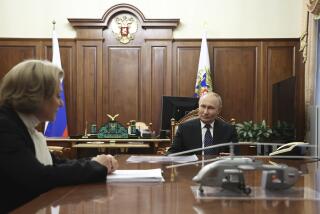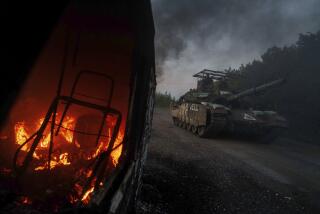Toll passes 100 in Kyrgyzstan riots
MOSCOW â In a desperate bid to stop the spread of ethnic violence in southern Kyrgyzstan, the interim government Sunday mobilized hundreds of reservist troops and issued a decree authorizing soldiers to shoot to kill rioters.
The move came after Moscow denied a request Saturday by interim President Roza Otunbayeva to send in Russian troops to quash the ethnic riots in the former Soviet republic.
More than 100 people have been killed in three days of fighting that began with clashes between the Kyrgyz and Uzbek ethnic groups in the city of Osh and has since spread to other areas of the south, including Jalal-Abad, according to news reports and officials. About 1,200 people have been injured.
An estimated 75,000 Uzbeks have fled across the border into neighboring Uzbekistan, an unnamed official with that nationâs Emergency Ministry told RIA Novosti news agency Sunday. A majority of them were women, children and injured people, the official said.
The plea for help from Russia was unusual for Kyrgyzstan, which gained its independence from Moscow with the breakup of the Soviet Union in 1991. Kyrgyzstan has been ruled by an interim government and plagued by occasional violence since a coup in April ousted President Kurmanbek Bakiyev.
Though Russia has said it will not intervene in what it called an internal Kyrgyzstan matter, it has sent additional troops to beef up security at a military base it maintains in northern Kyrgyzstan, Natalia Timakova, press secretary for Russian President Dmitry Medvedev, confirmed.
Earlier, a Russian defense source speaking on condition of anonymity had said that three Ilyushin Il-76 military transport planes carrying a battalion of troops had flown to the Russian base near the Kyrgyzstan city of Kant, far from the rioting, to provide extra security at the facility.
The U.S. also maintains an air base in northern Kyrgyzstan that is used for resupplying Western troops in Afghanistan.
The Kyrgyz governmentâs decision to mobilize an estimated 700 reservists came as local police and military troops have failed to bring the violence under control and reflected in part concerns about the ties between southern forces and the local population.
âIt is a reasonable step since all the local police and most of the troops stationed in the area are ethnic Kyrgyz and belong to the same clans as the organizers of the ethnic attacks in the south,â said Sergei Abashin, senior researcher at the Institute of Ethnology and Anthropology in Moscow. âBut I am afraid that this step is already late as the situation requires urgent action.â
Kyrgyz make up 70% of the countryâs population, whereas Uzbeks are the largest minority group, at 14%, and are concentrated in the south.
In Osh, rioting intensified Sunday after an overnight lull, according to local news reports. The Associated Press reported that triumphant crowds of Kyrgyz men had control of the city and the few remaining Uzbeks had barricaded themselves in their neighborhoods. Fires raged across the city of 250,000, and food was scarce.
Violence erupted over the weekend in Jalal-Abad, north of Osh, where 14 people were killed in rioting, officials said. On Sunday, a state of emergency and a curfew were declared.
Witnesses said many houses in the center of Jalal-Abad were on fire. Gangs of young men, white kerchiefs covering the lower part of their faces, many of them armed with automatic weapons, threw Molotov cocktails into Uzbek homes and looted and burned shops and cars.
Overnight, mobs reportedly burned down the central trade center and a TV station. They also reportedly captured a military unit and stole their weapons, and seized a police station.
âThese mobs made up of young Kyrgyz are armed, and the police and the military are not doing anything to disarm them since they are also Kyrgyz,â Murojon Alimov, 36, an Uzbek businessman, said in a telephone interview from Jalal-Abad. âI donât want to risk the lives of my family and try to get them out of the country, and the most important thing is that it is my city, and I was born here and we are not going away.
âI will stay in my home and will find a way to protect my wife and children to the last,â he said.
But Kimsanjon Mavlyanov, 55, an Uzbek trader, decided to take his large extended family and flee the city. âHow can we protect ourselves if we are not armed and all Kyrgyz have weapons?â Mavlyanov asked in a phone interview. âWhat can we do with empty hands?â
Mavlyanov said he took one last look as they were leaving Sunday morning. âThere was a huge cloud of black smoke all over my city,â he said in a shaky voice.
Researcher Abashin blamed the riots on the weakness of the interim government. Supporters of the former president and members of his clan probably âtook advantage of the situation and must have incited mobs of young men, poorly educated, idle, with no jobs,â he said.
âUzbeks were the easy prey as they have no access to weapons and they are the most vulnerable section of the local community,â he said. âLocal police would easily surrender their weapons to young Kyrgyz rioters as they have common relatives and friends in this clan, and they would never shoot at their own.â
Mavlyanov agreed. âThe police didnât shoot at the attackers, but they shot at us,â he said.
Bakiyev, in self-imposed exile in Belarus, said in an interview with Interfax news agency that he had nothing to do with the riots.
âInstead of mobilizing all necessary resources in time to localize the conflict, interim government representatives give interviews and hold press conferences,â he said, âwith the goal to once again lie about me and my relatives, accusing us of being involved in the riots.â
More to Read
Sign up for Essential California
The most important California stories and recommendations in your inbox every morning.
You may occasionally receive promotional content from the Los Angeles Times.










